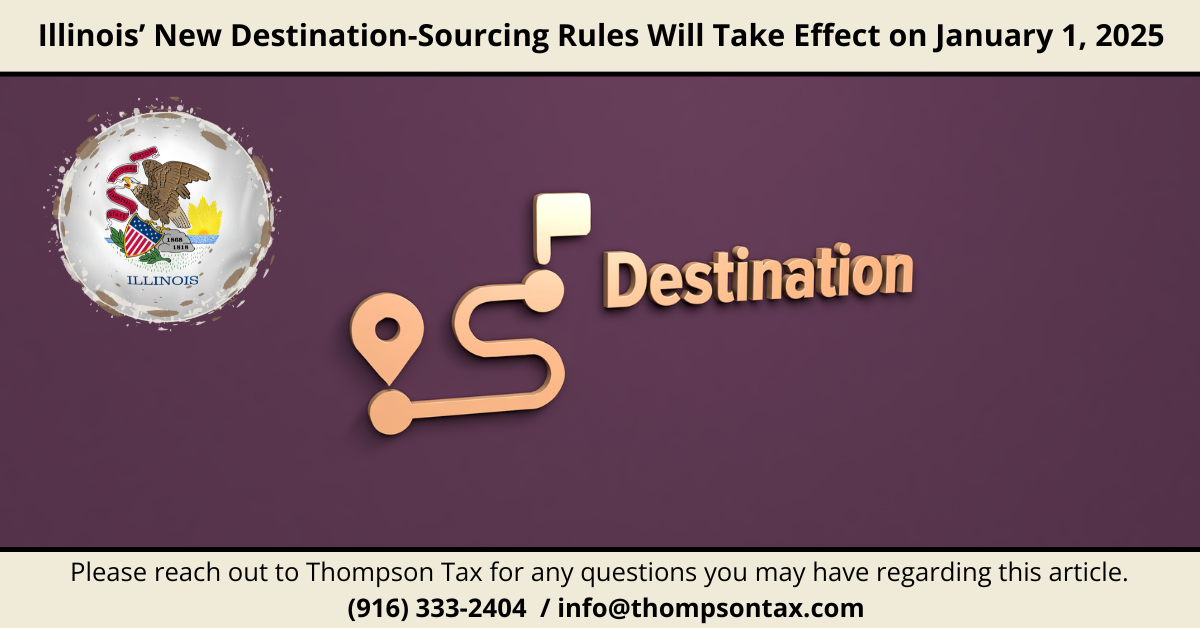
Illinois officially began applying destination sourcing rules for sales tax as part of the implementation of the Leveling the Playing Field for Illinois Retail Act, which became effective on January 1, 2021. This legislation was passed to align Illinois’ sales tax laws with the 2018 U.S. Supreme Court decision in South Dakota v. Wayfair, Inc., which allowed states to require out-of-state (remote) sellers to collect and remit sales tax based on the destination of the purchase.
Here’s a breakdown of its implementation:
- Pre-2021: Illinois primarily used origin-based sourcing for intrastate transactions, where sales tax was calculated based on the seller’s location.
- January 1, 2021: The destination sourcing rules took effect, requiring remote sellers and marketplace facilitators meeting Illinois economic nexus thresholds (i.e., $100,000 in sales or 200 transactions annually) to collect and remit tax based on the delivery address.
- Retailers’ Occupation Tax (ROT) Changes: The rules also extended to intrastate retailers delivering goods to customers in different jurisdictions within Illinois. Businesses had to collect local taxes applicable to the customer’s delivery address.
These changes significantly impacted how businesses calculated and remitted sales and use taxes, especially for online and remote sales.
Updates to these rules, as outlined in recent guidance issued by the Illinois Department of Revenue (IDOR), will take effect on January 1, 2025, and aim to clarify tax collection obligations based on the location where a product is delivered or a service is consumed.
Key Components of Illinois’ Guidance
1. Application to Retailers and Marketplaces
Illinois requires retailers, including those operating through third-party marketplaces, to collect and remit tax based on the customer’s location. This includes both in-state and remote sellers meeting the economic nexus threshold (e.g., $100,000 in sales or 200 transactions annually in Illinois).
2. Effective Date and Scope
While destination sourcing rules have been gradually implemented, the most recent guidance clarifies situations such as:
- When a product is shipped to a buyer in Illinois.
- When a product is picked up by the buyer at a location other than the seller’s principal place of business.
3. Local Tax Implications
Destination sourcing affects the local sales tax rates that apply. Illinois has a complex patchwork of local tax jurisdictions, and businesses must now determine the precise tax rate applicable to each transaction.
4. Software and Compliance Tools
IDOR recommends leveraging tax automation software to simplify the process of calculating the correct tax for every jurisdiction in Illinois. Businesses are advised to keep detailed records of delivery addresses and tax rates applied.
Who Is Affected by the Rules?
The new guidance impacts a broad range of entities, including:
- Brick-and-Mortar Retailers: Particularly those offering delivery services or shipping goods out of their immediate vicinity.
- eCommerce Sellers: Online retailers must ensure they collect the correct tax rate based on the customer’s delivery address.
- Marketplace Facilitators: Platforms facilitating third-party sales must collect and remit tax on behalf of sellers.
Challenges for Businesses
Adapting to destination sourcing rules presents several challenges:
- Complex Tax Jurisdictions: Illinois has over 300 local tax jurisdictions, each having its own distinct rates and rules.
- System Upgrades: Businesses may need to invest in new software or systems to determine tax rates for each transaction accurately.
- Increased Administrative Burden: Keeping up with changing rates and reporting requirements can strain resources, especially for small businesses.
Strategies for Compliance
Here’s how businesses can ensure compliance with the new rules:
- Audit Your Sales Processes: Review all sales channels to determine where destination sourcing applies.
- Invest in Technology: Implement sales tax compliance software to automate tax calculations and filings.
- Train Your Team: Ensure your accounting and sales teams understand the rules and can apply them correctly.
- Consult a Tax Professional: Seek advice from tax experts to navigate the complexities of Illinois’ tax system.
Looking Ahead
The clarification of destination-sourcing rules reiterates Illinois’ commitment to modernizing its tax framework in an era of eCommerce and digital transactions. While the new rules create challenges, they also ensure a fairer distribution of tax revenue across the state’s jurisdictions.
Businesses must act quickly to understand and comply with these changes to avoid penalties and ensure a seamless transition. Staying proactive by leveraging technology and seeking expert advice will be key to thriving in this evolving tax landscape.
Contact Thompson Tax today for all of your sales and use tax needs. We are your Trusted Tax Advisors and are always just a phone call away.